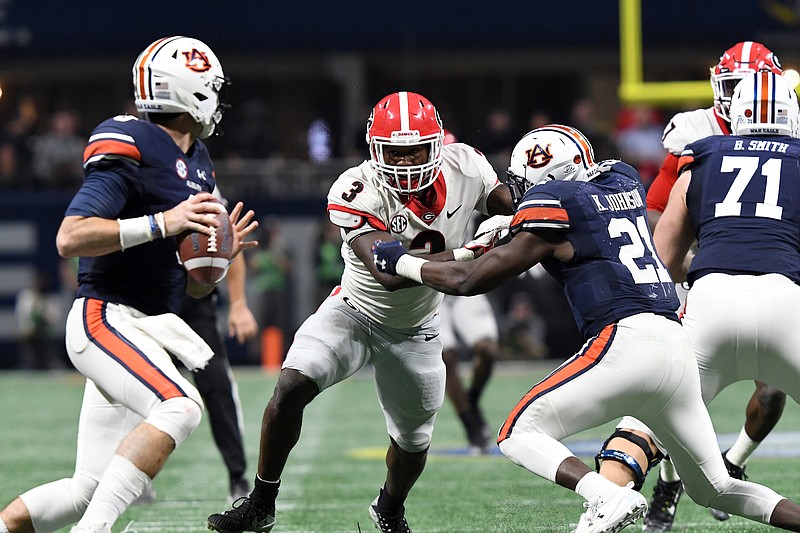In his five years as a defensive back in Georgia's program, Kirby Smart experienced two trips to the Peach Bowl and one journey to the Outback Bowl.
Smart has his alma mater in the College Football Playoff in just his second season as head coach of the Bulldogs, but he remembers being a redshirt junior in 1997, when Georgia followed up a 9-2 regular season with a 33-6 demolishing of Wisconsin in Tampa. Such experiences, he believes, would be lessened if the current four-team playoff format was expanded to eight or 16 teams.
"Speaking as a former student-athlete, some of my greatest memories were those bowl games that mattered to a 10-win season," Smart said, "and you would devalue that as you increase the number of teams in the playoff. Right now, we value the end of the season. You think about the last two or three weeks of the season and the amount of attention and the amount of big games - we probably got it more right this year than ever with a lot of the conference championship games as de facto play-in games.
"I think that's the right way to go about it."
Smart, along with Alabama's Nick Saban, Clemson's Dabo Swinney and Oklahoma's Lincoln Riley, participated this past week in Atlanta in a news conference promoting the upcoming four-team extravaganza, which will pit Clemson and Alabama in the Sugar Bowl and Oklahoma and Georgia in the Rose Bowl. Each of those matchups will take place New Year's Day.
All four coaches have playoff experience, with Smart having served as Alabama's defensive coordinator in the 2014 and 2015 playoffs and with Riley as Oklahoma's offensive coordinator in the 2015 event. All four have plenty of familiarity with conference championship games as well, and they are in agreement that four is the maximum number for the playoff field.
"I like the system that we have, to be honest with you," Swinney said. "I think we've been in a playoff mode every week for about four or five weeks now. Every week has been a playoff mentality for us, because if you lose you're probably out. It's been all you've got every single week.
"Every game is the biggest game of the year. I think the season is already long. It's very long."
Alabama and Clemson have met in each of the last two national title games as their respective conference champions, which means they played 15-game seasons. Increasing the playoff to eight teams would result in the two finalists likely having to play 16-game schedules, which matches the duration of the NFL's regular season.
Michigan coach Jim Harbaugh came to the Wolverines after a four-year stint with the NFL's San Francisco 49ers, and he's all for an expanded field.
"I would just analyze it in terms of every other sport, whether it's gymnastics, basketball, pro football, FCS football - pick a sport and they have a playoff to get to a champion," Harbaugh said this past week in a news conference for the Outback Bowl. "None of them start with the last four. You have a great model with the NFL, with their 12 teams, and a great model in the FCS, which had 16 teams and now has 24.
"Eight teams would be better than four and 12 would be better than eight. I think 16 is kind of the sweet spot."
Swinney counters Harbaugh's argument by stressing that fewer teams in a playoff enhances college football's regular season, which separates the sport in a good way.
"If you know you're in the playoffs, certain games become very irrelevant," Swinney said. "All of a sudden, you don't play certain players because you know you're in and you don't want to get a guy hurt. There are a lot of unintended consequences that would creep in, just like you see in all the other sports. I love the NBA, but I don't ever watch it until the playoffs, because it just doesn't matter. In our sport, it still matters. I mean, it matters. It matters what you do in September, October and November.
"There is nothing wrong with going 9-3 or 8-4. Maybe that's the best you were that year, and now you have a chance to go play a good bowl game somewhere and grow your team and develop some guys for the spring. That's kind of what I grew up in, and I'm kind of traditional in that."
This is the fourth playoff and the first with two teams from the same conference. Had an eight-team field been in place this season based on the final playoff rankings, a third SEC team - Auburn - would have been included before Pac-12 Conference champ Southern California, and there would still be the matter of Central Florida being left out despite its 12-0 record.
Riley admits there is no perfect number to please everyone, and Saban repeatedly has stated that the attention placed on the playoff already has lessened the importance of other postseason matchups.
"Bowl games don't coexist very well with the playoffs relative to importance," Saban said, "yet they are important to positive self-gratification for a lot of players, coaches and fans who've had a good season. Expanding the playoffs would minimize that to a larger degree in terms of the importance of bowl games and the importance of players playing in bowl games.
"There are some issues that go along with the current system, and if we go to eight teams I'm sure it won't be long before you all will want to be talking about 16. I don't care if we have 68 teams in it. We'll still have a two-hour show on who should have been in it, just like they do in basketball."
Contact David Paschall at dpaschall@timesfreepress.com or 423-757-6524.
